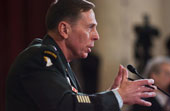
A capacity crowd awaited General David Petraeus and Ambassador Ryan Crocker in the Cannon House Office Building’s formal Caucus room, where, illuminated by overhead chandeliers, the pair testified all afternoon and into the evening, delivering their long-anticipated progress report on Iraq. Addressing a joint session of the House Armed Services and Foreign Affairs committees, Petraeus and Crocker expressed their belief that the so-called surge has been successful in improving the security situation in Iraq and recommended that the United States maintain heightened troop levels into next year. Meanwhile, they acknowledged that stabilizing the country—economically, politically, militarily—remains a distant goal.
For all of the strategizing and planning that preceded it, the hearing was peppered with unscripted moments. Peace protesters interrupted the proceedings on numerous occasions, shouting anti-war slogans and provoking threats of prosecution from Armed Services Committee Chairman Ike Skelton (D-Mo.), who ordered them removed by the Capitol Police. (Cindy Sheehan was among those arrested.) When it came time for Petraeus to deliver his remarks, a problem with the general’s microphone caused further delay. The interruptions seemed almost more than Skelton could bear. “This is a really important hearing!” he said at one point. After another protestor was hauled out of the hearing, his attempts to restore some dignity to the proceedings faded when he muttered, apparently unaware his microphone was still on, “That really pisses me off, damn it!”
As the hearing resumed, Petraeus appeared unruffled by the distractions, launching into a detailed assessment of the effects of the surge on the security situation in Iraq. The general recapped many of the successes that have been promoted by congressional Republicans in a series of hearings last week: U.S. forces have dealt “significant blows” to Al Qaeda in Iraq; Shia militias have been “disrupted”; both sectarian attacks and civilian deaths are declining; Iraqi security forces are beginning to “shoulder more of the load”; and, most notably, Sunni tribal leaders in Anbar province have turned on Al Qaeda and are now cooperating with U.S. forces. Petraeus emphasized this last point, noting that similar local alliances are now taking shape in Diyala and Nineveh provinces.
Petraeus accompanied his presentation with a series of charts portraying security improvements in several areas, such as the number of insurgent attacks, arms caches found and cleared, terrorist leaders captured, and the prevalence of sectarian attacks in Baghdad. Most showed mild signs of improvement, though some, including the Government Accountability Office, have questioned the accuracy of his statistics.
Having emphasized these “successes,” Petraeus finally arrived at what those assembled had been waiting to hear: his suggested timetable for a drawdown of U.S. troops. According to Petraeus, a Marine expeditionary unit will depart Iraq later this month, to be followed, if his recommendations are approved, by an additional combat brigade in December. All told, he proposes drawing down troops to pre-surge levels by mid-July 2008 and said that further redeployments would likely follow. “Force reductions will continue beyond the pre-surge levels of brigade combat teams that we will reach by mid-July 2008,” he said. “However, in my professional judgment, it would be premature to make recommendations on the pace of such reductions at this time.”
Of the two witnesses, Ambassador Crocker faced the greater challenge in portraying the positive effects of the surge. While Petraeus could point to security improvements, Crocker had few successes to highlight in his testimony. The surge had originally been designed to lay the groundwork for a political reconciliation between Iraq’s fractured, sectarian-based parties. Yet, eight months after the surge was unveiled by President Bush, there has been virtually no progress toward creating a functional central government in Baghdad, though Crocker pointed to political gains at the provincial level.
Still, Crocker remained optimistic. “A secure, stable democratic Iraq, at peace with its neighbors, is attainable,” he said. “The progress will not be quick, it will be uneven, punctuated by setbacks as well as achievements, and it will require substantial U.S. resolve and commitment. There will be no single moment at which we can claim victory; any turning point will likely be recognized only in retrospect.”
But as bad as things have gotten in Iraq, Crocker said, pulling out of Iraq prematurely could carry dire consequences for the Unites States, such as creating a power vacuum that would likely be filled by Iran—not to mention a vast refugee crisis. “An Iraq that falls into chaos or civil war will mean massive human suffering,” he said.
“Our current course is hard,” Crocker acknowledged. “The alternatives are far worse.”












